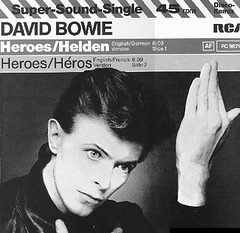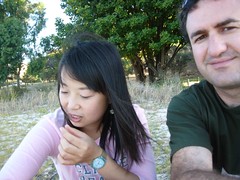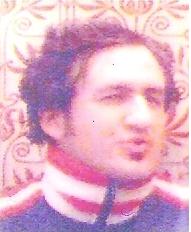More Baltic politics..
Once again, there is conflict between Estonia and the Russian Government. The Estonian government has inflamed the Russian authorities by removing a statue that commemorates Soviet soldiers from its location in the centre of Tallinn to a nearby cemetry. Emotions are high and the mess of 20th Century history and post-Soviet empire politics have bubbled to the surface once again. I have found a few comments from the net that express the situation, and probably better than i'd be able to say it. I'd be keen to hear what people have to say.
The Financial Times online edition (www,ft.com), dated 28/4/07, reports:
"For Estonia's ethnic Russians, as for Russians elsewhere, the memorial marks the sacrifices made by Soviet forces in the second world war. But many Estonians see the monument, in its central location, as a triumphalist symbol of communist oppression that lasted until the end of the Soviet Union.
Tensions flared at the memorial in May last year when Estonian nationalists clashed with ethnic Russians. Fearing May 9 this year would see a repeat, Andrus Ansip's centre-right coalition opted to move the memorial. Following a general election victory in March, Mr Ansip decided to act quickly despite protests from ethnic Russians, from Moscow and the opposition of Edgar Savisaar, the Tallinn mayor."
From the BBC World "Have your say" discussion, dated 29/4/07, Jaana from Tallinn states:
"Ivi Masso, columnist of the Estonian daily Päevaleht makes a statement that is roughly translated as: "It is difficult to imagine someone saying to descendents of Jews, victimised by nazis, that they should be tolerant to a statue of a nazi solder standing on one of the most prominent squares of their capital city, because the statue is an important symbol of German identity." And this statement is followed by a brilliant article.
Think about it."
And from the blog-site "Itching for Eestimaa", here is an exerpt dated from 11/1/07, before the riots began. Read the entire article on:
http://palun.blogspot.com/2007/01/ai-ai-ai.html
"..the Russian Federation's inability to take accountability for what happened in 1940 and 1944 and to continue to attempt to represent its "compatriots" abroad while at the same time demanding blanket foreign citizenship for them, only fuels the Estonian-Russian crisis in relations. When you constantly deny acts of hostility against a neighbor, and then attempt to include yourself in your neighbor's domestic policies on behalf of a local minority, you only sew fear and mistrust in your neighbor's country. Hence, an old war memorial still means something. Also, how can Estonians be expected to respect the dead of the Soviet Army, when the Russian government won't even hand back its morbid souvenir from Päts' death - his presidential regalia?"
There are pages and pages of discussion on this topic. I hope it's alright to quote other people's works here, I have sourced them so hopefully there's no copyright issues.. If there is, contact me and I'll remove it. I have put it up here because I find it very interesting.
Post colonial politics have always been a source of endless conflict. One nation mourns the loss of control whilst trying to maintain influence, while the smaller nation tries strengthen its independence. Colonialism has brought so many problems to the world. The concept of colonialism sounds to me like the school bully demanding lunch money, or a triad/mafia gang demanding 'protection' money, but on a national scale. It's as simple as that. World history just keeps repeating itself. Every history book I ever read is about a bigger power stomping on a smaller power, and then causing a heap of troubles when they aren't in charge anymore. And then a new big power appears and it starts all over again.
*Sigh*.. no wonder countries that aren't fighting wars love sport so much. Sport is a way of being king-pin of the world and having a strong sense of nationalism without having to invade anyone. Being a sports hero is a much safer than being a war hero, and you still get to use up all that testosterone! I guess that's why I love seeing huge sporty crowds, even though i'm not really into sport that much.
The Financial Times online edition (www,ft.com), dated 28/4/07, reports:
"For Estonia's ethnic Russians, as for Russians elsewhere, the memorial marks the sacrifices made by Soviet forces in the second world war. But many Estonians see the monument, in its central location, as a triumphalist symbol of communist oppression that lasted until the end of the Soviet Union.
Tensions flared at the memorial in May last year when Estonian nationalists clashed with ethnic Russians. Fearing May 9 this year would see a repeat, Andrus Ansip's centre-right coalition opted to move the memorial. Following a general election victory in March, Mr Ansip decided to act quickly despite protests from ethnic Russians, from Moscow and the opposition of Edgar Savisaar, the Tallinn mayor."
From the BBC World "Have your say" discussion, dated 29/4/07, Jaana from Tallinn states:
"Ivi Masso, columnist of the Estonian daily Päevaleht makes a statement that is roughly translated as: "It is difficult to imagine someone saying to descendents of Jews, victimised by nazis, that they should be tolerant to a statue of a nazi solder standing on one of the most prominent squares of their capital city, because the statue is an important symbol of German identity." And this statement is followed by a brilliant article.
Think about it."
And from the blog-site "Itching for Eestimaa", here is an exerpt dated from 11/1/07, before the riots began. Read the entire article on:
http://palun.blogspot.com/2007/01/ai-ai-ai.html
"..the Russian Federation's inability to take accountability for what happened in 1940 and 1944 and to continue to attempt to represent its "compatriots" abroad while at the same time demanding blanket foreign citizenship for them, only fuels the Estonian-Russian crisis in relations. When you constantly deny acts of hostility against a neighbor, and then attempt to include yourself in your neighbor's domestic policies on behalf of a local minority, you only sew fear and mistrust in your neighbor's country. Hence, an old war memorial still means something. Also, how can Estonians be expected to respect the dead of the Soviet Army, when the Russian government won't even hand back its morbid souvenir from Päts' death - his presidential regalia?"
There are pages and pages of discussion on this topic. I hope it's alright to quote other people's works here, I have sourced them so hopefully there's no copyright issues.. If there is, contact me and I'll remove it. I have put it up here because I find it very interesting.
Post colonial politics have always been a source of endless conflict. One nation mourns the loss of control whilst trying to maintain influence, while the smaller nation tries strengthen its independence. Colonialism has brought so many problems to the world. The concept of colonialism sounds to me like the school bully demanding lunch money, or a triad/mafia gang demanding 'protection' money, but on a national scale. It's as simple as that. World history just keeps repeating itself. Every history book I ever read is about a bigger power stomping on a smaller power, and then causing a heap of troubles when they aren't in charge anymore. And then a new big power appears and it starts all over again.
*Sigh*.. no wonder countries that aren't fighting wars love sport so much. Sport is a way of being king-pin of the world and having a strong sense of nationalism without having to invade anyone. Being a sports hero is a much safer than being a war hero, and you still get to use up all that testosterone! I guess that's why I love seeing huge sporty crowds, even though i'm not really into sport that much.







